Horses need shoes but cows don’t because of the different uses and lifestyles of these two animals.
- Cows: Cows spend most of their time grazing in fields, which is relatively soft and forgiving terrain. They also don’t carry heavy loads or travel long distances on a regular basis. As a result, their hooves are able to wear down naturally at a rate that keeps them healthy and strong.
- Horses: Horses are used for a variety of purposes, including riding, driving, and racing. They often travel long distances over hard surfaces, and they may carry heavy loads. This puts a lot of stress on their hooves, which can lead to wear and tear, cracking, and other problems.
Horseshoes can help to protect horses’ hooves from these stresses and keep them healthy and sound. They can also improve traction and performance, especially on hard surfaces.
It’s important to note that not all horses need shoes. Some horses, such as those that are kept in pasture and only used for occasional light riding, may be able to go barefoot without any problems. However, many horses benefit from regular shoeing, especially those that are used for more demanding activities.
Here are some specific examples of why horses may need shoes:
- To protect their hooves from wear and tear on hard surfaces. Horses that are ridden on roads, trails, or other hard surfaces can wear down their hooves quickly. Shoes can help to prevent this and keep the hooves healthy.
- To improve traction on slippery surfaces. Horses that compete in events such as jumping or cross-country riding may need shoes to improve their traction on slippery surfaces.
- To correct imbalances in the hoof. Horses with certain hoof problems, such as laminitis or uneven wear, may need shoes to correct the imbalance and prevent further damage.
- To improve performance. Some horses, such as racehorses, may benefit from shoes to improve their performance.
Ultimately, the decision of whether or not to shoe a horse is a case-by-case one. A qualified farrier can assess the horse’s hooves and lifestyle and make a recommendation.
Do Horse Shoes Hurt horses?
When properly fitted and applied, horseshoes should not hurt horses. The outer wall of the horse’s hoof, where the shoe is nailed on, does not contain any nerve endings. However, if a horseshoe is not properly fitted or applied, it can cause pain and discomfort for the horse.
Here are some things that can cause horseshoes to hurt horses:
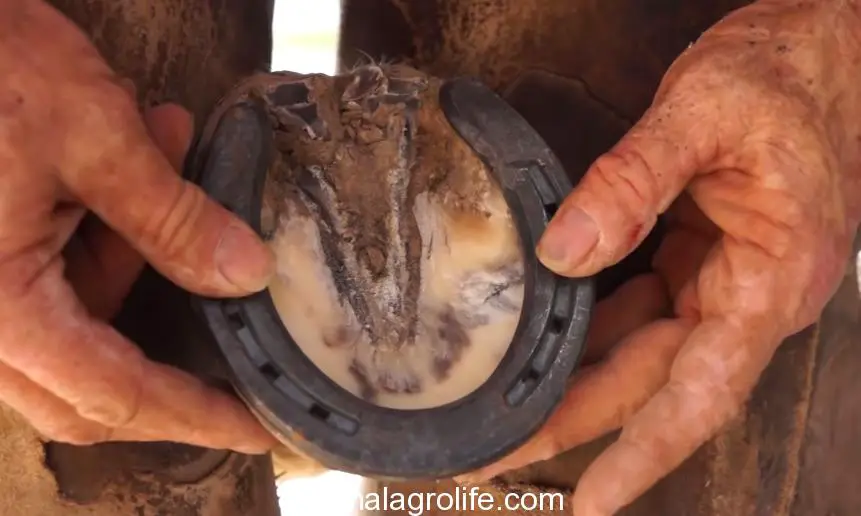
- Improper fitting: If the shoe is too tight or too loose, it can rub against the sensitive tissues of the hoof, causing pain.
- Improper nail placement: If the nails are not placed correctly, they can penetrate the sensitive inner part of the hoof.
- Damaged shoe: If the shoe is damaged or worn, it can become sharp and cause pain when the horse walks.
- Foreign objects under the shoe: If there are any foreign objects, such as stones or gravel, under the shoe, they can cause pressure and pain on the hoof.
If you notice any signs that your horse’s horseshoes are causing pain, such as lameness, reluctance to move, or swelling in the hoof, you should contact your veterinarian or farrier immediately.
Here are some tips for preventing horseshoes from hurting horses:
- Only use horseshoes that are properly fitted and applied by a qualified farrier.
- Inspect your horse’s hooves regularly for signs of damage or wear.
- Replace worn or damaged shoes as soon as possible.
- Keep your horse’s hooves clean and free of foreign objects.
If you have any concerns about whether or not your horse’s horseshoes are hurting them, talk to your veterinarian or farrier.
Do Race Horses Wear Shoes?
Yes, most racehorses wear shoes. Racehorses hit the ground with great concussive force when they run, so their hooves need to be protected. Shoes can also help to improve traction and performance.
Racehorses typically wear aluminum horseshoes because they are lightweight and strong. Some horses may also wear carbon fiber shoes, which are even lighter and stronger.
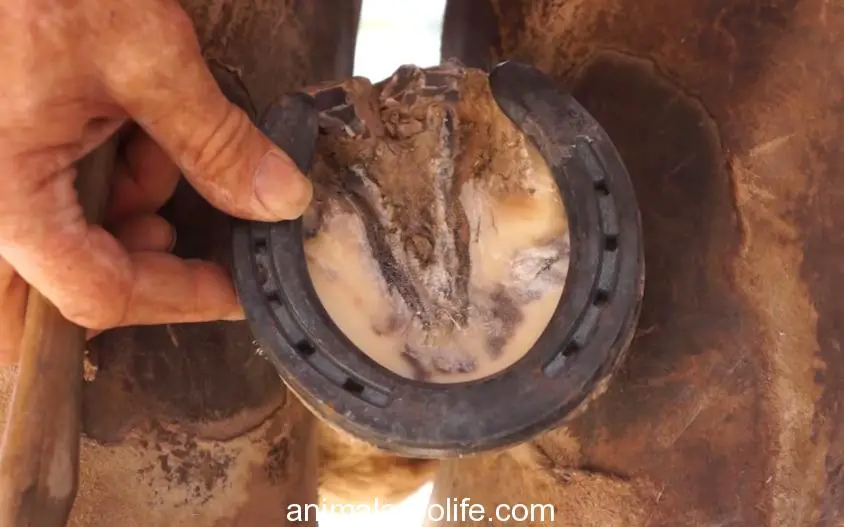
The shoes are fitted by a farrier, who trims the horse’s hooves and nails the shoes onto the hoof wall. The shoes are typically replaced every few weeks or months, depending on the horse’s workload.
While most racehorses wear shoes, there are some horses that do not need them. These horses may have naturally strong hooves or may not be used for demanding activities. However, most racehorse trainers choose to shoe their horses to protect their hooves and improve their performance.
Do Donkeys Need shoes?
Most donkeys do not need shoes. Donkeys have naturally strong hooves that are well-adapted to walking on hard surfaces. They also have a thicker sole than horses, which helps to protect them from impact and wear.
However, there are some cases where donkeys may benefit from wearing shoes. For example, donkeys that are ridden on hard surfaces or that have certain hoof problems may need shoes to protect their hooves and prevent further damage.
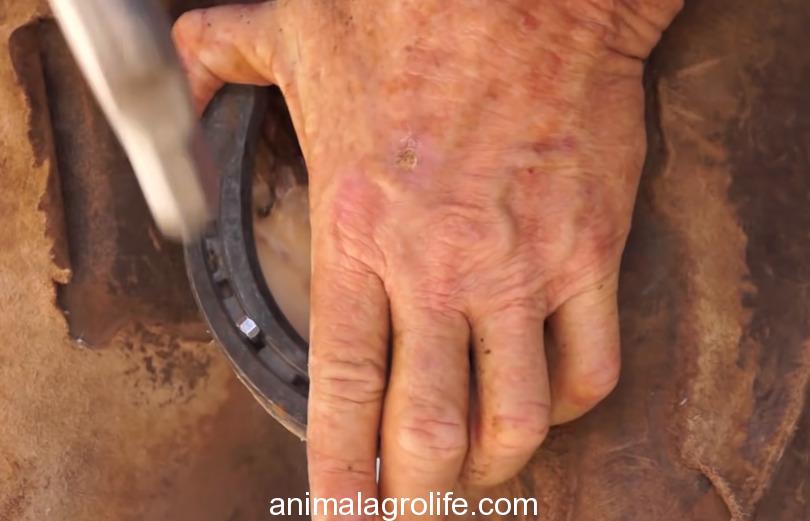
Here are some specific examples of when a donkey may need shoes:
- Donkeys that are ridden on paved roads or trails may wear down their hooves quickly. Shoes can help to prevent this and keep the hooves healthy.
- Donkeys that work in wet or icy conditions may need shoes to improve their traction.
- Donkeys with certain hoof problems, such as laminitis or uneven wear, may need shoes to correct the imbalance and prevent further damage.
- Donkeys that are used for competitive driving or other demanding activities may benefit from shoes to improve their performance.
If you are unsure whether or not your donkey needs shoes, you should talk to your veterinarian or farrier. They can assess your donkey’s hooves and lifestyle and make a recommendation.
If you do decide to shoe your donkey, it is important to use horseshoes that are specifically designed for donkeys. Donkeys have different hoof anatomy than horses, so it is important to use shoes that fit properly and will not cause discomfort.
It is also important to have your donkey’s hooves trimmed regularly by a qualified farrier. This will help to ensure that the shoes are fitting properly and that the donkey’s hooves are healthy.
Overall, most donkeys do not need shoes. However, there are some cases where shoes may be beneficial. If you are unsure whether or not your donkey needs shoes, you should talk to your veterinarian or farrier.
How Often Do Horses Need New Shoes
Horses typically need new shoes every four to six weeks. This is because the horse’s hooves continue to grow even when they are shod. If the shoes are not replaced regularly, the hooves can become overgrown, and the horse may develop hoof problems.
However, there are a number of factors that can affect how often a horse needs new shoes, including:
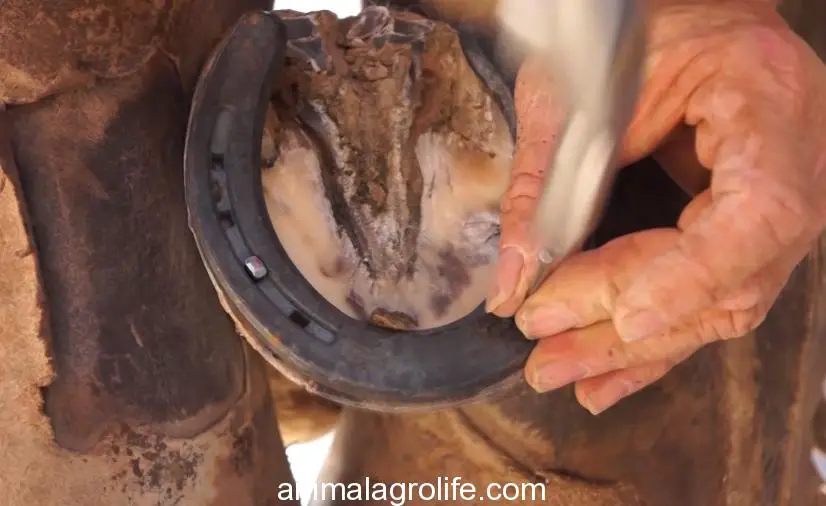
- The horse’s workload: Horses that are ridden or driven more often will wear down their shoes more quickly.
- The type of surface the horse is working on: Horses that work on hard surfaces, such as pavement or concrete, will wear down their shoes more quickly than horses that work on softer surfaces, such as grass or dirt.
- The condition of the horse’s hooves: Horses with weak or damaged hooves may need new shoes more often.
If you are unsure how often your horse needs new shoes, you should talk to your veterinarian or farrier. They can assess your horse’s needs and make a recommendation.
Here are some tips for extending the life of your horse’s shoes:
- Use shoes that are made of durable materials, such as aluminum or steel.
- Have your farrier apply the shoes properly.
- Keep your horse’s hooves clean and free of debris.
- Avoid working your horse on hard surfaces for extended periods of time.
By following these tips, you can help to extend the life of your horse’s shoes and reduce the need for frequent shoe replacements.
What Did Horses Do Before Shoes?
Horses have been domesticated for thousands of years, but horseshoes were not invented until around 400 BC. Before that, horses went barefoot.
Wild horses and feral horses today still go barefoot. They are able to survive and thrive without shoes because their hooves are naturally tough and resilient. Horses that live in the wild or on pasture typically have softer hooves than horses that are ridden or driven regularly.
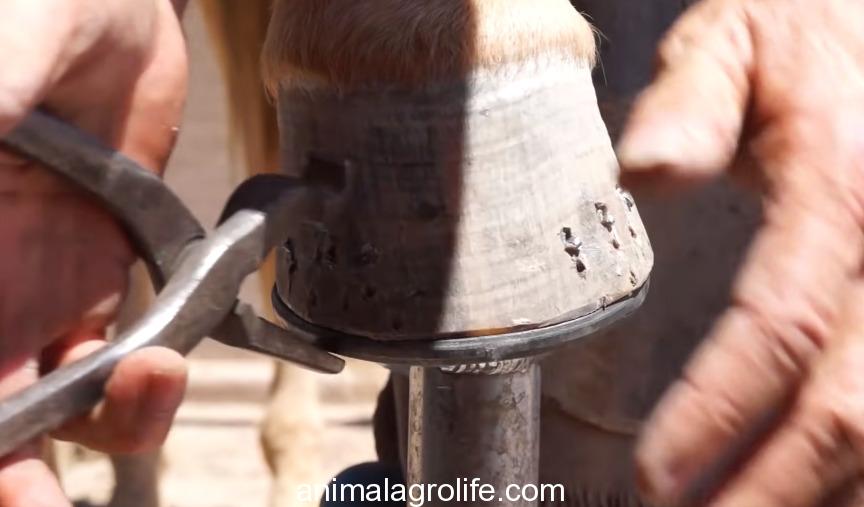
Horses that went barefoot before shoes were invented were able to adapt to different surfaces and conditions. They were able to walk on hard surfaces, such as rocky trails, without damaging their hooves. They were also able to walk through mud and water without slipping.
However, horses that went barefoot were also more susceptible to hoof problems, such as cracks, splits, and infections. They were also more likely to develop lameness.
Horseshoes were invented to help protect horses’ hooves from wear and tear, especially on hard surfaces. They can also help to improve traction and performance.
Today, most horses that are ridden or driven regularly wear shoes. However, there is a growing movement towards barefoot horsemanship. Barefoot horsemanship is the practice of keeping horses’ hooves trimmed and healthy without using shoes.
Barefoot horsemanship proponents believe that horses’ hooves are better able to function naturally without shoes. They also believe that barefoot horses are healthier and more comfortable.
Whether or not to shoe a horse is a decision that should be made on a case-by-case basis. Horses that are used for heavy work or that live in harsh conditions may benefit from wearing shoes. However, horses that are kept in pasture and used for light riding may be able to go barefoot without any problems.
Why are Horses Shoed And Not Cows?
Horses are shoed for a number of reasons, including to:
- Protect their hooves from wear and tear. Horses that are ridden or driven on hard surfaces, such as roads or trails, can wear down their hooves quickly. Shoes can help to prevent this and keep the hooves healthy.
- Improve traction on slippery surfaces. Horses that are ridden or driven in wet or icy conditions may need shoes to improve their traction.
- Correct imbalances in the hoof. Horses with certain hoof problems, such as laminitis or uneven wear, may need shoes to correct the imbalance and prevent further damage.
- Improve performance. Horses that are used for competitive riding or driving may benefit from shoes to improve their performance.
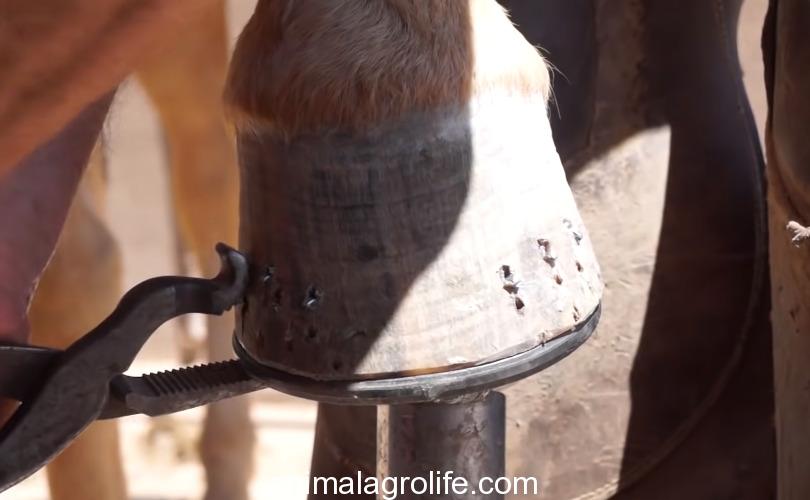
Cows are not typically shoed because they do not have the same needs as horses. Cows spend most of their time grazing in fields, which is relatively soft and forgiving terrain. They also don’t carry heavy loads or travel long distances on a regular basis. As a result, their hooves are able to wear down naturally at a rate that keeps them healthy and strong.
However, there are some cases where cows may need to be shod. For example, cows that are used for work, such as oxen, may need shoes to protect their hooves from wear and tear. Cows that have hoof problems may also need shoes to correct the problem and prevent further damage.
Ultimately, the decision of whether or not to shoe a cow is a case-by-case one. A qualified veterinarian or farrier can assess the cow’s hooves and lifestyle and make a recommendation.
Can You Put Horseshoes on Cows?
Yes, you can put horseshoes on cows, but it is not typically done. Cows have different hoof anatomy than horses, so horseshoes do not always fit properly. Additionally, cows do not typically need the same protection for their hooves as horses do.
However, there are some cases where it may be necessary to put horseshoes on a cow. For example, a cow that is used for work, such as an ox, may need horseshoes to protect its hooves from wear and tear. A cow with hoof problems may also need horseshoes to correct the problem and prevent further damage.
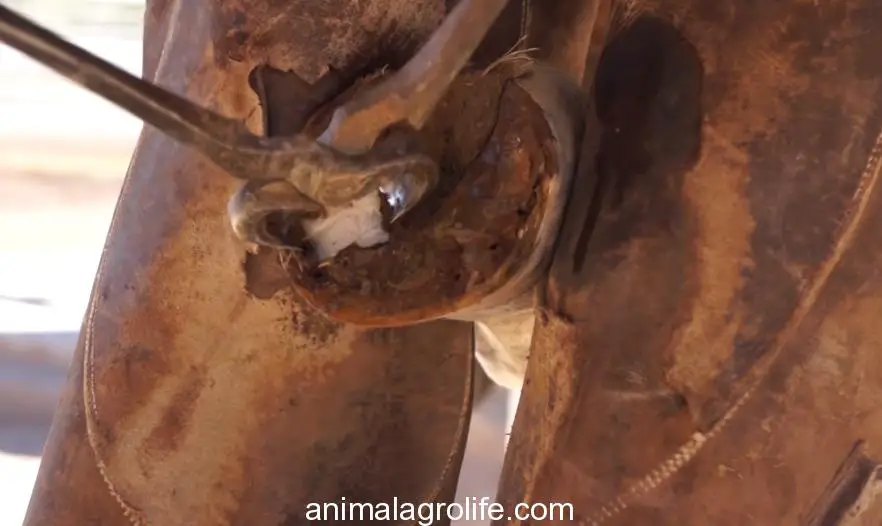
If you are considering putting horseshoes on a cow, it is important to consult with a qualified veterinarian or farrier. They can assess the cow’s hooves and lifestyle and make a recommendation.
Here are some things to keep in mind if you do decide to put horseshoes on a cow:
- Use horseshoes that are specifically designed for cows.
- Have the horseshoes applied by a qualified farrier.
- Inspect the cow’s hooves regularly to make sure that the horseshoes are fitting properly and that the cow is not experiencing any discomfort.
If you notice any signs that the cow is uncomfortable with the horseshoes, such as lameness or swelling in the hooves, remove the horseshoes immediately and contact your veterinarian or farrier.
Why Do Horses Need Shoes But Not Wild Horses?
There are a few reasons why horses need shoes but wild horses do not.
- Domesticated horses are used for a variety of purposes, including riding, driving, and racing. This often involves traveling long distances on hard surfaces and carrying heavy loads. Wild horses, on the other hand, do not have the same demands placed on their hooves.
- Domesticated horses have different hoof anatomy than wild horses. Domesticated horses have softer hooves that are more susceptible to wear and tear. Wild horses have harder hooves that are better adapted to walking on hard surfaces.
- Domesticated horses are often kept in stables or pens. This limits their ability to move around and wear down their hooves naturally. Wild horses, on the other hand, are constantly moving, which helps to keep their hooves healthy and strong.
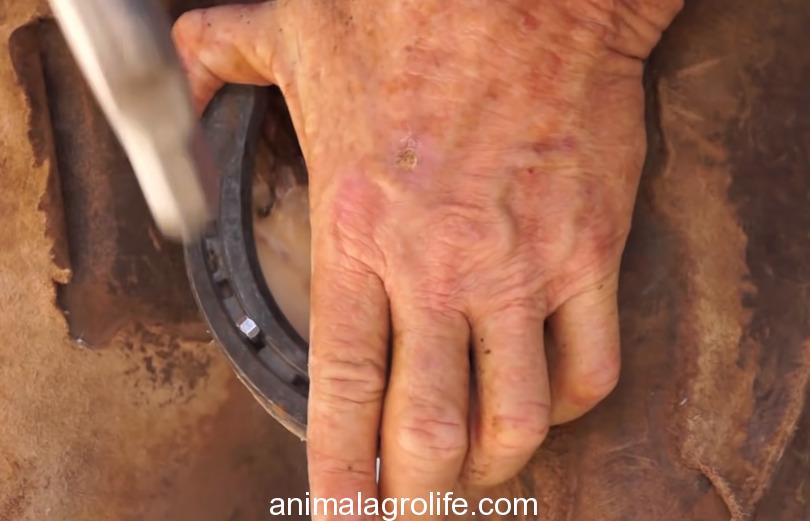
Here are some specific examples of why domesticated horses may need shoes:
- To protect their hooves from wear and tear on hard surfaces. Domesticated horses that are ridden or driven on roads, trails, or other hard surfaces can wear down their hooves quickly. Shoes can help to prevent this and keep the hooves healthy.
- Improve traction on slippery surfaces. Horses that are ridden or driven in wet or icy conditions may need shoes to improve their traction.
- Correct imbalances in the hoof. Domesticated horses with certain hoof problems, such as laminitis or uneven wear, may need shoes to correct the imbalance and prevent further damage.
- Improve performance. Domesticated horses that are used for competitive riding or driving may benefit from shoes to improve their performance.
It’s important to note that not all domesticated horses need shoes. Some horses, such as those that are kept in pasture and only used for occasional light riding, may be able to go barefoot without any problems. However, many domesticated horses benefit from regular shoeing, especially those that are used for more demanding activities.
Ultimately, the decision of whether or not to shoe a horse is a case-by-case one. A qualified farrier can assess the horse’s hooves and lifestyle and make a recommendation.
What Happens If You Don’t Put Shoes on a Horse?
Horses that are not shod may experience a number of problems, including:
- Wear and tear on the hooves: Horses that are ridden or driven on hard surfaces without shoes are more likely to wear down their hooves quickly. This can lead to cracks, splits, and other damage.
- Hoof infections: Horses that are not shod are more likely to develop hoof infections. This is because their hooves are more exposed to dirt, bacteria, and other pathogens.
- Lameness: Horses with damaged or infected hooves may develop lameness. This is because they will be reluctant to put weight on their hooves, which can lead to muscle atrophy and other problems.
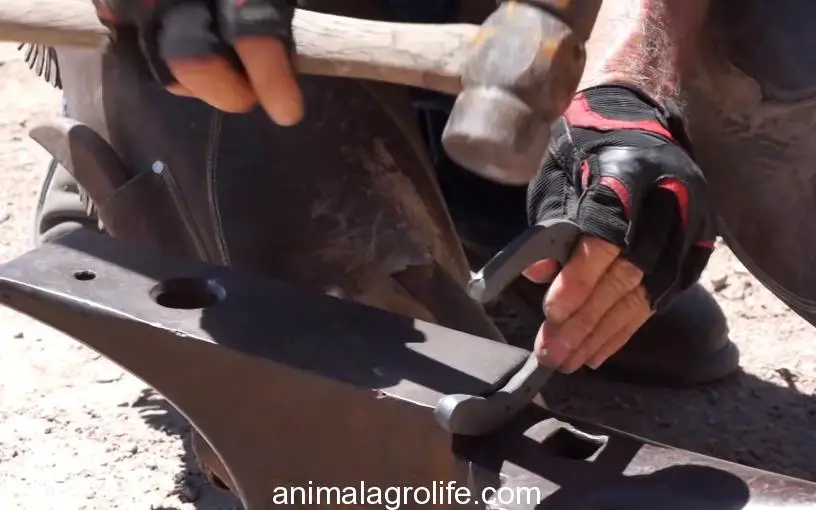
In addition to these problems, horses that are not shod may also have difficulty performing certain tasks, such as jumping or pulling carriages. This is because their hooves may not provide enough traction or support.
However, there are also some benefits to keeping horses barefoot. For example, barefoot horses may have better circulation in their hooves and may be less likely to develop certain hoof problems, such as thrush. Additionally, barefoot horses may be more comfortable and have better movement.
Whether or not to shoe a horse is a decision that should be made on a case-by-case basis. Horses that are used for heavy work or that live in harsh conditions may benefit from wearing shoes. However, horses that are kept in pasture and used for light riding may be able to go barefoot without any problems.
If you are considering keeping your horse barefoot, it is important to talk to your veterinarian or farrier. They can help you to assess your horse’s needs and make recommendations for how to keep their hooves healthy.
So Why Don’t Cows Need Shoes, Too?
Cows don’t need shoes for a few reasons:
- Cows have different hoof anatomy than horses. Cow hooves are harder and more durable than horse hooves. They also have a thicker sole, which provides more protection from wear and tear.
- Cows don’t typically travel as far or carry as much weight as horses. This means that their hooves don’t experience the same level of stress.
- Cows spend most of their time grazing in fields, which is relatively soft and forgiving terrain. This means that their hooves don’t have to withstand the same amount of impact as horse hooves.
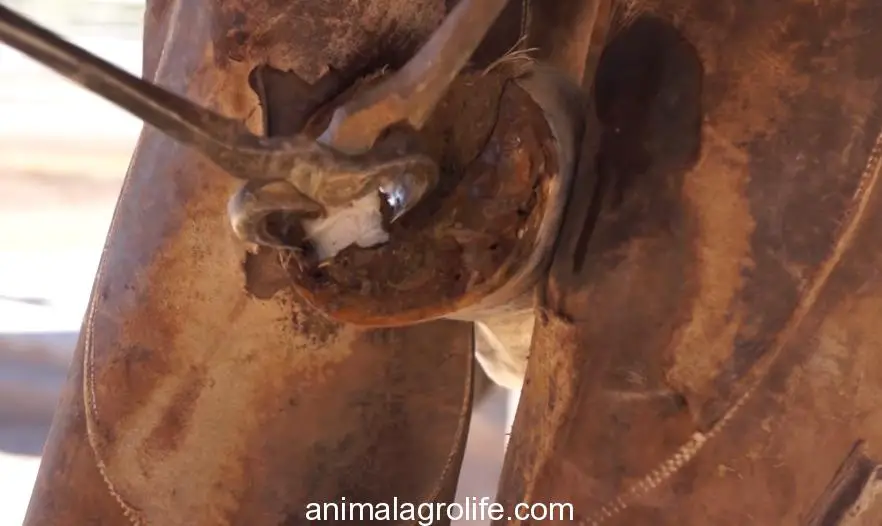
However, there are some cases where cows may need shoes. For example, cows that are used for work, such as oxen, may need shoes to protect their hooves from wear and tear. Cows with hoof problems may also need shoes to correct the problem and prevent further damage.
Ultimately, the decision of whether or not to shoe a cow is a case-by-case one. A qualified veterinarian or farrier can assess the cow’s hooves and lifestyle and make a recommendation.
Here is a table that summarizes the key differences between horse and cow hooves:
| Characteristic | Horse Hooves | Cow Hooves |
|---|---|---|
| Hardness | Softer | Harder |
| Sole thickness | Thinner | Thicker |
| Travel and weight | Travel further and carry more weight | Travel less and carry less weight |
| Terrain | Varied terrain, including hard surfaces | Soft terrain, such as fields |
| Need for shoes | More likely to need shoes | Less likely to need shoes |
It is important to note that these are just general guidelines. There may be exceptions to the rule. For example, a horse that is kept in pasture and used for light riding may not need shoes, while a cow that is used for work may need shoes. It is always best to consult with a qualified veterinarian or farrier to make the best decision for your individual animal.
reference
1.https://equinespoint.com/why-do-horses-need-shoes-but-not-cows/
2.https://www.mentalfloss.com/article/655903/why-do-horses-need-shoes-cows-dont
3.This article was written by Bard, a large language model from Google AI. You can learn more about Bard athttps://bard.google.com/.










